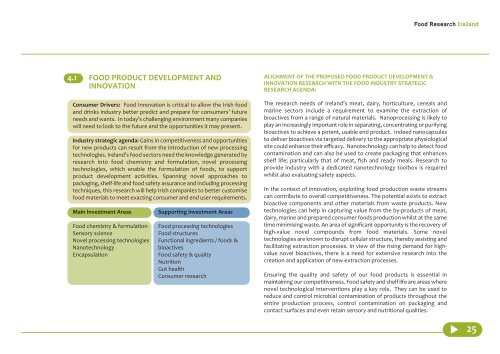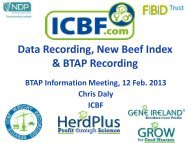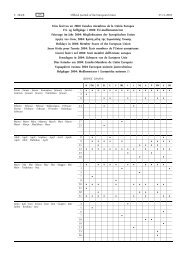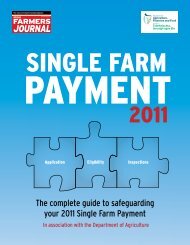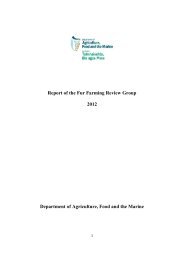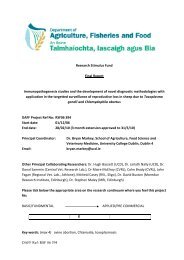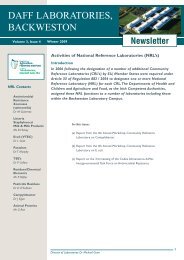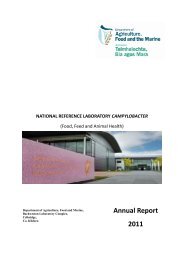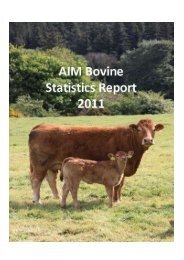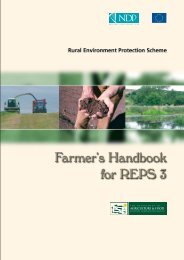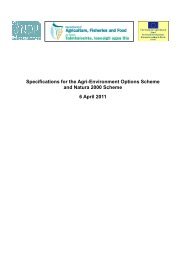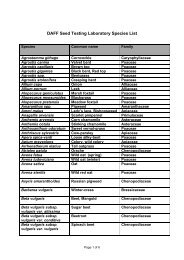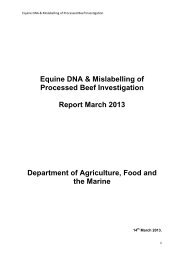Food Research Ireland - Department of Agriculture
Food Research Ireland - Department of Agriculture
Food Research Ireland - Department of Agriculture
Create successful ePaper yourself
Turn your PDF publications into a flip-book with our unique Google optimized e-Paper software.
4.1 FOOD PRODUCT DEVELOPMENT AND<br />
INNOVATION<br />
Consumer Drivers: <strong>Food</strong> Innovation is critical to allow the Irish food<br />
and drinks industry better predict and prepare for consumers’ future<br />
needs and wants. In today’s challenging environment many companies<br />
will need to look to the future and the opportunities it may present.<br />
Industry strategic agenda: Gains in competitiveness and opportunities<br />
for new products can result from the introduction <strong>of</strong> new processing<br />
technologies. <strong>Ireland</strong>’s food sectors need the knowledge generated by<br />
research into food chemistry and formulation, novel processing<br />
technologies, which enable the formulation <strong>of</strong> foods, to support<br />
product development activities. Spanning novel approaches to<br />
packaging, shelf-life and food safety assurance and including processing<br />
techniques, this research will help Irish companies to better customise<br />
food materials to meet exacting consumer and end user requirements.<br />
Main Investment Areas Supporting investment Areas<br />
<strong>Food</strong> chemistry & formulation <strong>Food</strong> processing technologies<br />
Sensory science <strong>Food</strong> structures<br />
Novel processing technologies Functional ingredients / foods &<br />
Nanotechnology bioactives<br />
Encapsulation <strong>Food</strong> safety & quality<br />
Nutrition<br />
Gut health<br />
Consumer research<br />
ALIGNMENT OF THE PROPOSED FOOD PRODUCT DEVELOPMENT &<br />
INNOVATION RESEARCH WITH THE FOOD INDUSTRY STRATEGIC<br />
RESEARCH AGENDA:<br />
<strong>Food</strong> <strong>Research</strong> <strong>Ireland</strong><br />
The research needs <strong>of</strong> <strong>Ireland</strong>’s meat, dairy, horticulture, cereals and<br />
marine sectors include a requirement to examine the extraction <strong>of</strong><br />
bioactives from a range <strong>of</strong> natural materials. Nanoprocessing is likely to<br />
play an increasingly important role in separating, concentrating or purifying<br />
bioactives to achieve a potent, usable end product. Indeed nanocapsules<br />
to deliver bioactives via targeted delivery to the appropriate physiological<br />
site could enhance their efficacy. Nanotechnology can help to detect food<br />
contamination and can also be used to create packaging that enhances<br />
shelf life; particularly that <strong>of</strong> meat, fish and ready meals. <strong>Research</strong> to<br />
provide industry with a dedicated nanotechnology toolbox is required<br />
whilst also evaluating safety aspects.<br />
In the context <strong>of</strong> innovation, exploiting food production waste streams<br />
can contribute to overall competitiveness. The potential exists to extract<br />
bioactive components and other materials from waste products. New<br />
technologies can help in capturing value from the by-products <strong>of</strong> meat,<br />
dairy, marine and prepared consumer foods production whilst at the same<br />
time minimising waste. An area <strong>of</strong> significant opportunity is the recovery <strong>of</strong><br />
high-value novel compounds from food materials. Some novel<br />
technologies are known to disrupt cellular structure, thereby assisting and<br />
facilitating extraction processes. In view <strong>of</strong> the rising demand for highvalue<br />
novel bioactives, there is a need for extensive research into the<br />
creation and application <strong>of</strong> new extraction processes.<br />
Ensuring the quality and safety <strong>of</strong> our food products is essential in<br />
maintaining our competitiveness. <strong>Food</strong> safety and shelf life are areas where<br />
novel technological interventions play a key role. They can be used to<br />
reduce and control microbial contamination <strong>of</strong> products throughout the<br />
entire production process, control contamination on packaging and<br />
contact surfaces and even retain sensory and nutritional qualities.<br />
▼<br />
25


